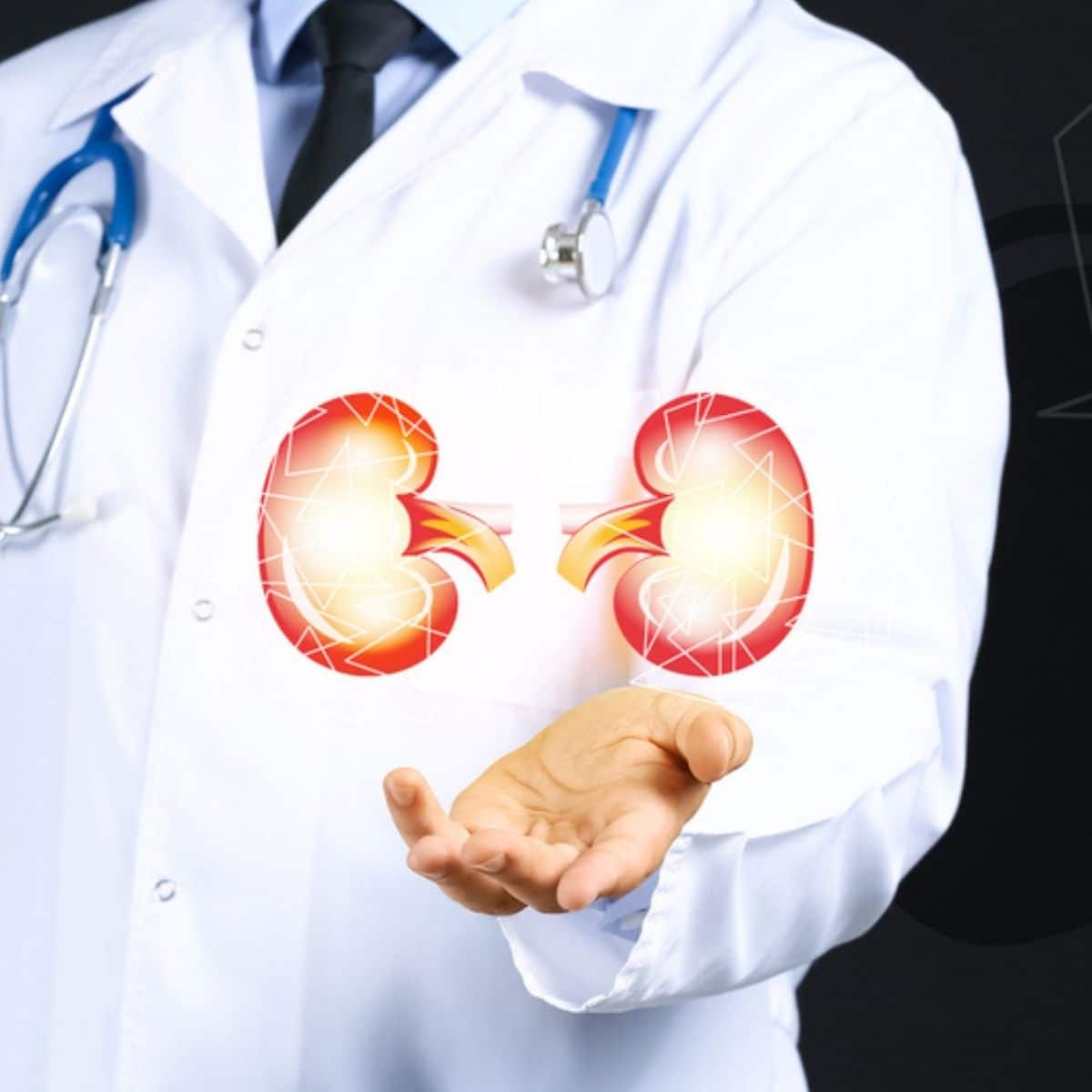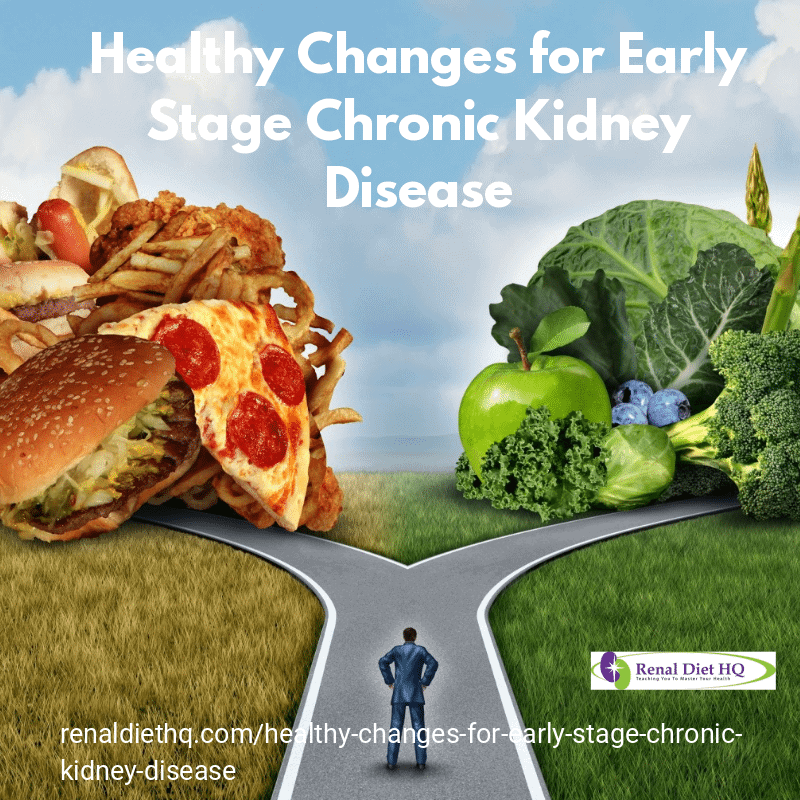Early Stage Kidney Disease
If you have been diagnosed with early stage kidney disease, consider yourself lucky. Unlike most people who are diagnosed in later stages of the condition, an early kidney disease diagnosis gives you the opportunity to take control and slow down or even halt the progression of the disease.
However, this requires major changes to your lifestyle, especially when it comes to your diet. You need to follow a kidney-safe diet that is low in sodium and high in fresh fruits and vegetables, grains, and lean protein (why low protein diet in kidney disease).

Maintaining vigilance over your kidney health is crucial for managing chronic kidney disease. By making healthy changes through lifestyle modifications such as implementing a balanced exercise routine and avoiding unhealthy habits like smoking or excessive drinking, you can greatly improve your overall health and wellbeing.
In this article, we will provide you with an overview of early stage kidney disease by discussing its symptoms and how to manage it through diet and lifestyle approaches. By understanding how to make these necessary adjustments while collaborating with healthcare providers along the way, you can ensure that your kidneys stay healthy for many years to come.
Jump to:
- Key Takeaways
- Diagnosis and Monitoring
- Importance of Lifestyle Changes
- Risk Factors
- eGFR Measurement
- Healthy Diet
- Exercise
- Maintenance
- Importance of Medication Adherence
- Common Causes
- Symptoms to Watch For
- Hereditary Factors
- Collaboration with Healthcare Providers
- FAQs for Healthy Changes for Early Stage Chronic Kidney Disease
- Lifestyle Changes Can Help You Manage Early Stage Kidney Disease
Key Takeaways
- Early diagnosis of kidney disease allows for more control over how the condition progresses and provides the opportunity to slow or halt the progression of kidney damage.
- Major changes to diet, including avoiding salt intake and focusing on fresh fruits and vegetables, grains, and lean protein, are necessary for managing chronic kidney disease.
- Regular follow-up with healthcare providers, including kidney doctors and nutritionists, is crucial for maintaining kidney health and managing chronic kidney disease.
- Making healthy changes, including a kidney-safe diet and regular exercise, can improve overall health and wellbeing and potentially avoid end-stage renal disease.
For More Recipes and Ideas --->> Get Your Free Meals and Recipes That Are Perfect for Pre-Dialysis Diets, Pre-Dialysis with Diabetes, or Dialysis Diets.
Diagnosis and Monitoring

If you suspect you may have early stage kidney disease, it's important to visit your doctor and get regular tests to monitor your eGFR and kidney function. Early detection is key in managing this condition, as it allows for more control over how the disease progresses.
Your doctor may recommend diagnostic tests such as a urine test or imaging or even a kidney biopsy to enable analysis of kidney tissue to confirm the diagnosis. Once diagnosed with early stage kidney disease, monitoring strategies will be put in place to track any changes in kidney function.
This may include regular blood tests to monitor kidney function every year or more frequently if necessary. Your healthcare provider will also discuss treatment options with you, which may include lifestyle changes such as a kidney-safe diet and exercise plan. Medications may also be prescribed to help manage high blood pressure or other chronic conditions that can contribute to kidney damage.
Proper follow-up with healthcare providers is crucial for maintaining kidney health when diagnosed with early stage kidney disease. Regular visits with doctors, nephrologists, and nutritionists may be necessary for ongoing management of the condition. Regular blood work and medication adjustments may also be necessary over time.
By working closely with your medical team and following their recommendations, you can take steps towards slowing down the progression of this condition and maintaining overall health and wellbeing.
Importance of Lifestyle Changes
To improve your overall health and wellbeing, it's important to make healthy lifestyle choices. These changes include quitting smoking, exercising regularly, eating a kidney-safe diet with the help of a nutritionist, maintaining a healthy weight, and avoiding painkillers that may worsen your kidney disease. These changes can also slow down the progression of early stage kidney disease and prevent further damage to your kidneys.
Regular exercise benefits everyone, including those with early stage kidney disease. Exercise can help manage high blood pressure, which is a common cause of kidney damage. Aim for at least 150 minutes of moderate-intensity physical activity every week. But, talk to your doctor before starting any new exercise routine.
Dietary restrictions may be necessary for those with early stage kidney disease. A nutritionist can help you develop a kidney-safe diet plan that includes fresh fruits and vegetables, grains, lean protein sources, and limited amounts of sodium and amounts of phosphorous.
Additionally, reducing stress through relaxation techniques like meditation or yoga can benefit overall health and wellbeing while helping lower blood pressure levels. Finally, getting enough sleep each night is another key factor in maintaining good health while managing early stage kidney disease.
Risk Factors
Maintaining a healthy lifestyle and being aware of certain risk factors can help decrease the risk of complications related to loss of kidney function. Prevention strategies include making lifestyle modifications, such as quitting smoking, exercising regularly, eating a balanced diet with the help of a registered dietitian, reducing stress, and keeping a healthy weight.
Additionally, early detection through regular doctor visits and blood tests to calculate eGFR can lead to medical interventions that can slow the progression of kidney disease.
To better understand these risk factors and prevention strategies, it may be helpful to look at them in table format:
| Risk Factors | Lifestyle Modifications | Medical Interventions |
| High blood pressure | Lower sodium intake; take prescribed blood pressure medications | ACE inhibitors or Angiotension Receptor Blockers |
| Diabetes | Maintain proper glucose levels; take prescribed diabetes medications; get routine check-ups | Medications for blood sugar control |
| Family history of kidney disease | Regular monitoring through eGFR tests; maintain a healthy lifestyle | Blood pressure control medication |
By following these prevention strategies and understanding your individual risk factors for kidney disease, you can reduce your chances of developing complications related to kidney function. Early detection is key in managing this condition successfully and slowing its progression (progression of symptoms for CKD).
Taking steps towards preventing chronic kidney disease should be taken seriously. Incorporating healthy habits into daily routines such as exercise and consulting with healthcare professionals regarding nutrition will go a long way in maintaining overall good health.
eGFR Measurement
Calculating eGFR is a simple blood test that can help determine the health of your kidneys. The test measures how well your kidneys are filtering waste products and excess fluids from your blood. The results provide an estimate of your kidney function and help determine the stage of chronic kidney disease (CKD) you may be experiencing.
It's important to note that normal eGFR ranges can vary based on factors such as age, sex, weight, and age. Interpreting eGFR results requires working closely with a healthcare provider who understands individual medical history and lab values.
The frequency of eGFR testing will depend on individual health status and level of kidney function. Generally speaking, those with early stage CKD may only need to have their eGFR measured once per year. Those with advanced stages may require more frequent testing to monitor their condition and medication dosages may need to be adjusted accordingly for optimal kidney function management (ckd and diabetes medications).
Healthy Diet
Eating a healthy diet is crucial for keeping your kidneys functioning properly and preventing further damage. When you have early stage kidney disease, it's important to work with a registered dietitian who has special training in kidney disease management. They can help you plan meals that meet your dietary restrictions and provide guidance on kidney safe foods.
Here are some general guidelines to keep in mind when planning meals for early stage kidney disease:
- Limit sodium intake to prevent fluid buildup, swelling, high blood pressure, and heart strain.
- Monitor protein intake to prevent waste buildup in the blood.
- Adjust potassium intake based on kidney function and medications.
- Limit phosphorus intake as necessary to maintain bone health.
In addition to working with a nutritionist, there are many resources available for healthy recipes that are suitable for people with stage 1-2 kidney disease. With proper meal planning and dietary guidance, you can help slow the progression of chronic kidney disease while maintaining a balanced and satisfying diet.
Exercise
Exercise is healthy for any lifestyle, and there is no exception for chronic kidney disease. Exercise helps to strengthen your entire body, not just the muscles on the outside of your body, but the inside muscles as well.
A strong heart can help with high blood pressure, which is one of the leading causes of kidney disease (or worsening of kidney disease).
It’s generally recommended to exercise 150 minutes of moderate-intensity physical activity every week, but you should always check with your doctor to see if exercising is suitable for your condition.
Maintenance
While diet and exercise are two huge parts of a healthy lifestyle for chronic kidney disease, you also need to make sure you are maintaining proper follow-ups with your healthcare providers. Kidney specialists and even nutritionists are sometimes needed, so you may have regular visits to follow up with.
There also may be regular blood work and medications to keep up with. Try keeping a journal to keep up with appointments. A journal can also help you keep up with what you are eating, not just to share with your providers but also to help make sure you are staying on track with your diet. Vigilance is key.
Making drastic changes to your diet and lifestyle can be difficult at first, but making these changes is so important to your health and wellbeing. Making these changes and being vigilant about maintaining your new kidney healthy diet and lifestyle can make such a difference (kidney diet foods).
First, these changes can help you feel better and lessen or avoid uncomfortable symptoms. Second, you can actually slow or even halt the disease progression by making and sticking to strict changes. This means that you have the opportunity to potentially avoid end-stage kidney disease.
Talk to your doctor about these and other healthy changes you can make for early stage chronic kidney disease. You may be feeling down about your diagnosis, but you can take advantage of the benefits of an early diagnosis.
Importance of Medication Adherence
Now that you understand the importance of a healthy diet for early stage kidney disease, it's also crucial to talk about the significance of medication adherence.
Taking your prescribed medications as directed is essential in slowing the progression of kidney disease and preventing further complications. Non-adherence to medication can have severe consequences, including decrease in kidney function, hospitalization, and even death.
It's important to understand why taking your medications matters and how it helps manage your condition. Your healthcare provider can explain how each medication works and its role in managing your kidney disease. Staying on track with medication can be challenging, but there are tips for overcoming barriers.
Involving healthcare providers in your treatment plan can help you stay motivated and accountable. They may suggest reminders or tools to help you remember to take your medications at the appropriate times. Additionally, keeping a journal or using an app can aid in tracking when you take each dose.
Remember that following through with medication adherence is just as crucial as eating well and exercising regularly for maintaining good health with early stage kidney disease.
Common Causes
Understanding the common causes of CKD can help you identify potential risk factors and take steps to prevent kidney damage. While high blood pressure and diabetes are the most common causes of chronic kidney disease, there are other factors that can contribute to its development. These include hereditary conditions, obesity, heart disease, smoking, infections, and certain medications.
To reduce your risk of developing CKD or slow its progression, prevention methods should be employed. This includes managing underlying health conditions such as high blood pressure and diabetes through medication adherence and lifestyle adjustments like maintaining a healthy diet and exercise routine (exercise for healthy heart).
Additionally, avoiding exposure to harmful chemicals and substances, such as heavy metals or excessive alcohol consumption, can also lower your risk.
Incorporating these strategies into your daily life can help reduce your risk for developing chronic kidney disease or slow its progression if already diagnosed with early stage kidney disease. By taking an active role in managing your health through preventative measures and regular monitoring by healthcare providers you can improve overall well-being while minimizing complications associated with this condition.
Symptoms to Watch For
It's important to pay attention to any changes in urine output or urine color, fatigue, swelling in the legs or ankles, or trouble concentrating as these are potential symptoms of chronic kidney disease (can diet improve ckd symptoms).
While these symptoms can be caused by a variety of medical conditions, it's essential to seek medical attention if you experience them regularly. Early detection of signs of kidney disease is key in managing chronic kidney disease and slowing its progression.
Early CKD may be asymptomatic and symptoms may not be detectable until the later kidney disease stages. However, if you experience signs of kidney damage such as persistent puffiness around the eyes, swollen ankles and feet, foamy urine, or blood in your pee, then it is important to seek medical attention promptly.
Treatment options for early stage kidney disease focus on slowing progression through lifestyle adjustments like diet modifications and physical activity recommendations. Regular monitoring by healthcare providers is crucial in managing this condition.
| Symptoms of Kidney Disease | Kidney Disease Prevention Methods |
| Lack of energy and trouble sleeping | Control blood pressure & diabetes |
| Dry itchy skin | Maintain a healthy diet & exercise routine |
| Abnormal urine (foamy or bloody) or increased urine flow | Monitor abnormalities of kidney function regularly |
| Swollen eyes, ankles, and feet | Avoid overuse of pain medications & NSAIDs |
| Muscle cramps | Quit smoking |
| Poor Appetite | Limit alcohol intake |
If you've been diagnosed with early stage kidney disease, making lifestyle modifications can help manage the condition. These modifications include eating a healthy kidney-safe diet, exercising regularly, and managing stress. It's crucial to work closely with your healthcare provider to determine which lifestyle changes are best for your individual needs.
Managing stress is particularly important for individuals with early stage kidney disease as stress can contribute to high blood pressure and exacerbate additional health conditions that may cause further damage to the kidneys. Finding ways to cope with stress such as meditation or breathing exercises can be beneficial in improving overall health and wellbeing (high blood pressure and kidney disease).
By being vigilant about potential symptoms of chronic kidney disease and making necessary lifestyle modifications, individuals with early stage kidney disease can take control of their health and potentially prevent further damage to their kidneys.
Hereditary Factors
Managing chronic kidney disease requires paying attention to hereditary factors that can increase the risk of developing the condition. Family history is a significant factor in determining inherited risk, and individuals with a family history of kidney disease should be aware of their increased susceptibility. Genetic testing may also be beneficial for those concerned about their risk.
Genetic predisposition plays a role in many cases of kidney disease, but familial factors such as lifestyle and diet also contribute to the development and progression of the condition. A healthy lifestyle can help prevent or slow down the onset of chronic kidney disease even for those with an inherited risk. This includes maintaining a balanced diet, avoiding smoking, exercising regularly, managing stress levels, and getting enough sleep.
If you have a family history of kidney disease or are concerned about your risk for developing it, it's important to discuss this with your healthcare provider. They may recommend genetic testing or other diagnostic tests for kidney disease and provide guidance on how to manage any identified risks. With proper management and lifestyle changes, individuals can reduce their chances of developing chronic kidney disease or slow its progression if already diagnosed.
Collaboration with Healthcare Providers
To effectively manage your chronic kidney disease, you need to collaborate closely with your healthcare providers. This involves building trust and maintaining clear communication with your doctors, nurses, and other care team members. With their guidance and expertise, you can better understand the condition and additional options available to you.

Patient education is a crucial aspect of this collaborative approach. Your healthcare providers can offer valuable insights into how best to manage your condition, including dietary changes, lifestyle modifications, medication management, and more. By working together to create a personalized treatment plan, you can ensure that you're doing everything possible to slow the progression of kidney damage (commonly prescribed medications for CKD).
Regular follow-up appointments are also essential for effective collaboration between patients and healthcare providers. These visits allow for ongoing monitoring of your kidney function and overall health status. Through this ongoing relationship-building process, you can establish a strong foundation for managing your chronic kidney disease over the long term.
FAQs for Healthy Changes for Early Stage Chronic Kidney Disease
While medication and lifestyle changes are the most effective treatments for early stage kidney disease, there are some alternative options to consider. Some studies have suggested that acupuncture may help to improve kidney function, reduce inflammation, and alleviate pain in people with kidney disease.
Certain herbs, such as astragalus and cordyceps, have also been used in traditional Chinese medicine to treat kidney disease. However, more studies are still required to determine the safety and effectiveness of acupuncture and herbs in kidney patients. It's important to consult with a healthcare provider before trying these approaches.
Additionally, holistic approaches such as massage therapy and stress reduction techniques can improve overall health and wellbeing. However, it's crucial to remember that dietary restrictions are a key component of managing early stage kidney disease and shouldn't be overlooked or replaced by alternative treatments without medical guidance.
It's also important to note that while these alternative treatments may be helpful for some people, they should never be used as a substitute for medical treatment. It's essential to work closely with your healthcare provider to develop a comprehensive kidney care plan that addresses all aspects of your condition.
Taking care of your mental wellbeing and emotional health is important, especially when dealing with any chronic disease. Coping strategies such as mindfulness, meditation, and therapy can help manage stress and anxiety that may arise from a diagnosis (how to reduce stress naturally).
Support systems, including friends, family, and support groups, can provide a sense of community and understanding. Self care techniques such as exercise, proper sleep habits, and hobbies can also improve overall wellbeing. It's essential to prioritize self care in order to maintain a positive outlook on life while managing any health condition.
In general, it is not recommended for kidney patients to use herbal supplements. While there are supplements that may claim to improve poor kidney function, it's important to understand their effectiveness before taking them. Some herbal supplements may cause kidney damage and even worsen your kidney disease, and they could also interact with other medications.
Clinical research on the effectiveness of these supplements is limited, and dosage recommendations vary. It's best to consult with a healthcare provider before taking any supplements or vitamins for kidney health. They can help you determine if these supplements are safe and provide personalized recommendations based on individual factors and blood test results.
A well-balanced diet, regular exercise, and proper medical follow-up are crucial for maintaining kidney health in early stage kidney disease (early stage kidney disease).
To improve kidney health, there are several renal friendly foods and hydration tips that you can incorporate into your kidney-friendly diet.
Superfoods like blueberries, cranberries, and strawberries are great options because they contain antioxidants that protect the kidneys from damage.
Other beneficial foods include apples, bell peppers, garlic, and cauliflower. It's important to be mindful of dietary restrictions for those with early stage kidney disease, avoiding high sodium and processed foods in favor of fresh fruits and vegetables is key (processed foods and CKD).
Adequate fluid intake is also crucial for kidney health, aim to drink at least 8 glasses of water per day if you have early stage kidney disease unless otherwise instructed by a healthcare provider. However, it's important to note that herbal remedies should be avoided as they may have negative effects on the kidneys.
Consultation with a registered dietitian can help create a personalized plan for improving kidney health through diet and lifestyle changes.
When it comes to exercise limitations, early stage kidney disease may not have a significant impact on your ability to engage in physical activity. However, as the disease progresses, you may experience muscle wasting and increased cardiovascular risks that can limit your ability to exercise.
It's important to work closely with healthcare providers to develop an individualized plan for physical therapy or rehabilitation programs that take into account your specific needs and limitations. With proper monitoring and care, regular exercise can help improve overall health and potentially slow progression of kidney disease.
Lifestyle Changes Can Help You Manage Early Stage Kidney Disease
Congratulations on taking the first step towards managing your early stage kidney disease. With a proper diagnosis and ongoing monitoring, you can take control of your health and slow down the progression of the condition.
It's important to work closely with your healthcare providers to develop an individualized plan that focuses on lifestyle changes and a kidney-safe diet. By making healthy choices, such as increasing physical activity, reducing sodium intake, and eating a balanced diet full of fresh fruits and vegetables, whole grains, and lean protein sources, you can improve your overall health while also managing your early stage kidney disease.
In addition to these lifestyle changes, it's crucial to monitor any symptoms or changes in eGFR levels and collaborate with healthcare providers to adjust care accordingly. Remember that early detection is key in managing chronic kidney disease.
By staying vigilant about symptoms and working closely with healthcare providers, you can take control of your health and improve outcomes for years to come. With dedication to lifestyle changes and continued monitoring of the condition, you can live a healthy life with early stage kidney disease.















